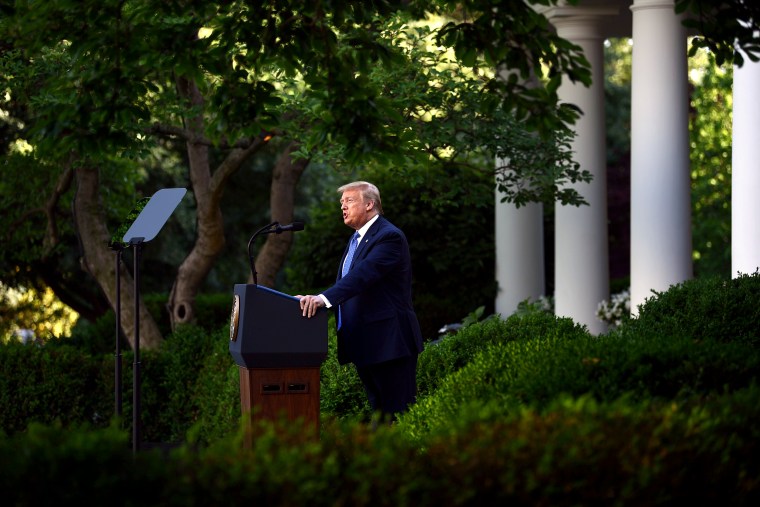WASHINGTON — President Donald Trump plans to publicly address policing reform while meeting with law enforcement and African American faith leaders in Dallas on Thursday, a senior administration official said, as the White House continues to struggle with a political and policy response on the issue.
The president could also announce some measures to address the issue of race and policing in the United States that he can do on his own with an executive order, the official said.
More than two weeks after the death of George Floyd in police custody, the White House has yet to settle on a message in reaction to concerns about police brutality and systemic racism in law enforcement that have triggered widespread protests.
White House aides had hoped earlier in the week that Trump would formally unveil a package of proposals on policing reforms as early as Thursday, administration officials told NBC News.
But with the White House still in discussions with congressional Republicans and so far still unable to settle on a package of measures, Trump is more likely to unveil a broader proposal of policy changes, including legislation, later this week or next week, the senior administration official said.
“We’re close,” the official said, adding that the White House’s goal is to propose “targeted things that people could get behind and could be enacted very quickly.”
Among the legislative ideas being discussed: banning chokeholds, creating a national registry for police officers engaged in misconduct, and curbing no-knock warrants.
Trump has stressed to aides that it is important to him to keep most of the law enforcement community on board with whatever policing reforms the White House proposes, officials said.
White House aides have discussed possible policing proposals with victims of police violence, as well as with lawmakers on Capitol Hill, and Trump met with members of law enforcement Monday, officials have said. His meeting Thursday with African American faith leaders will be his first such public meeting.
As protests spread across the country last week, Trump was mostly silent on the underlying issues driving them, focusing instead on using law enforcement and the military to control the unrest surrounding some demonstrations. When a reporter asked last week what his plan was to address systemic racism, he said it was ”the strongest economy in the world.”
The president has spoken publicly about — and denounced — the circumstances of Floyd’s death, but he did not address it Tuesday, when Floyd's funeral was held in Houston. Trump’s Democratic rival, Joe Biden, however, offered condolences to the Floyd family during an emotional taped address that urged the country to use his death as a moment for action to address systemic racism.
Trump’s only reference Tuesday to the issue of police conduct was a tweet floating a baseless conspiracy theory that an elderly Buffalo man shoved and seriously injured by police was an antifa activist who had effectively staged his injury. White House officials have privately said the tweet was unhelpful and have been discussing ways to try to clean it up.
A campaign adviser called the tweet “not helpful” and an “unforced error." McEnany defended the tweet, saying Trump "was asking questions about an interaction in a video clip he saw, and the president has the right to ask those questions."
Floyd's brother Philonise Floyd was in Washington on Wednesday to testify before Congress on his brother's death. When asked whether he had been invited to the White House while in Washington, press secretary Kayleigh McEnany did not answer directly, saying only that Trump "has repeatedly acknowledged George Floyd, his passing, the egregiousness of that atrocity and has called the family by phone, as he did last week."
Moments before the press briefing, Trump tweeted his opposition to renaming military bases and institutions named after Confederate military leaders, a move several current and former defense officials have said should be under consideration.
"The United States of America trained and deployed our HEROES on these Hallowed Grounds, and won two World Wars. Therefore, my Administration will not even consider the renaming of these Magnificent and Fabled Military Installations," Trump said in a series of tweets, which McEnany handed out to reporters as a printout, saying the statement had come "directly from the president, and we spent some time working on that."
Meanwhile, Trump and his campaign have been trying to seize on calls from some Democrats to defund police departments. Campaign advisers said they view it as a winning issue for them because they believe any efforts to scale back police funding and use the resources for social services programs would turn off moderate voters. Biden said this week that, like Trump, he does not support defunding the police.
Trump’s event in Dallas on Thursday marks the start of a series of events in coming weeks focused on a theme of “remembering forgotten Americans,” which the White House says includes minority communities, industries such as manufacturing, and faith groups, according to the official. Future events under the “remembering forgotten Americans” theme will be aimed at the economic empowerment of underserved communities.
Republicans on Capitol Hill have been working to come up with their own bill, led by Sen. Tim Scott, R-S.C. Senate Republicans are in close contact with the White House but plan to move regardless of the president’s plans and hope he backs their bill, according to a GOP aide.
While there is immense pressure on all sides to pass a police reform bill, the White House and the Republicans remain far apart on an agreement with the Democrats. One major sticking point is White House opposition to a key Democratic policy proposal: rolling back qualified immunity for law enforcement, which shields police from being personally liable for their conduct.
Further complicating any hopes of negotiation, post-impeachment tensions remain: The president and House Speaker Nancy Pelosi have not spoken since, with one White House official saying it would “not be constructive” for the two to speak this close to an election.



